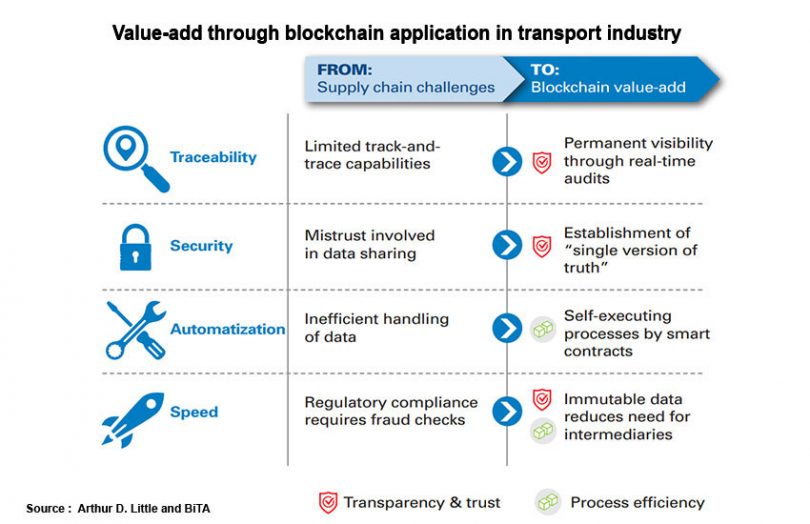While blockchain has moved past the hype cycle and real use cases are emerging, the transport sector has been slow to reap any significant benefit. Nonetheless, a survey conducted by management consulting firm Arthur D. Little and BiTA (Blockchain in Transport Alliance), found that 57% of respondents believe that blockchain could disrupt business models.
The consulting firm says that project results are at odds with the initial enthusiasm of their promoters. The logistics sector is massive, at $4,730 billion in revenues in 2018.
When asked about specific applications of blockchain in the transport industry, 73% of respondents said it could increase process efficiency. This ranked as the top benefit for the executives, followed by addressing compliance requirements (66%). While security is an ever-pressing need, only 41% of respondents said blockchain could contribute to improving security, and 45% chose to remain neutral.
The report focuses on blockchain’s potential in creating transparency and trust and improving process efficiency. The former has applications in combatting counterfeit goods as well as regulation and compliance. The consultants reference pharmaceuticals, and Ledger Insights has written extensively about blockchain and pharma sector compliance with DSCSA legislation. When it comes to efficiency, the focus is on automation and speed of executing tasks
ADL discusses the potential of use cases surrounding these two application areas. It cites the example of Swiss container specialist SkyCell which developed a blockchain solution for track and trace of biopharmaceuticals using IoT sensors. The focus was on recording the temperature data on the blockchain to ensure the secure storage of goods.
While a few solutions are already fully in production (10%), and 7% in early production, about 24% of respondents had not started any projects, and 43% were still in the planning stage. ADL explores the barriers to blockchain adoption and found that 65% of respondents saw the lack of proven benefits, while 64% did not have the expertise to adopt the technology.
“We recommend that companies undertake robust assessments of market, commercial and technical factors, as well as their own capabilities with regard to blockchain, before jumping into implementations that may fail to deliver,” said ADL.
The survey was conducted online with executives of more than 100 transport companies.
Recent blockchain surveys:
Accenture: blockchain for aerospace
Boston Consulting Group: blockchain for transport and logistics
Cap Gemini blockchain survey
Deloitte 2019 blockchain survey
Deloitte 2018 blockchain survey
EY blockchain (finance and tech professionals) survey
EY fintech adoption survey
EY APAC blockchain survey
IDC semi-annual enterprise blockchain forecast
IHS Markit survey
Juniper enterprise blockchain survey
KPMG technology industry innovation survey
PwC blockchain survey
PwC China blockchain survey
SAP blockchain survey
World Energy Council / PwC blockchain survey
WIPRO blockchain survey
Capital Markets & Digital currencies:
Swiss Stock Exchange trader survey
TD Bank payments industry survey
BNY Mellon payments survey
State Street digital asset custody survey
Friss insurance survey
BIS Central Bank Digital Currency survey
OMFIF/Ipsos Mori Digital Currency consumer survey 2020
IBM / OMFIF Central Bank Digital Currency survey 2018
IBM / OMFIF Central Bank Digital Currency survey 2019
ING general population cryptocurrency attitudes






